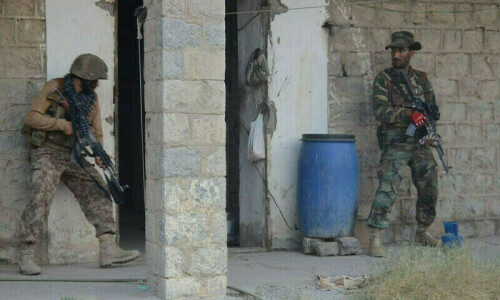HAFIZ Mohammad Iqbal, a resident of Bampokha village in Buner district, was born blind but not without a vision.
Despite the fact that his whole family was well-educated, they were unaware that a school for the blind was set up in Swat in 1991. Besides, they were reluctant to send Iqbal far away from home.
As most often happens to by-birth blind and physically challenged children, following a stereotypical approach in our society, Iqbal too was sent to a nearby seminary for memorisation of the Holy Quran.
But getting an education in a school was his dream. At home, young Iqbal had no option but to listen to radio channels and it helped him chisel his taste for singing, Naatkhwani and playing cricket. “Media is my first teacher as it gave me so much. At times it can do wonders if properly utilised when it comes to social awareness and mass mobilisation,” Mr Iqbal told Dawn.
Though he was born blind, his father, a teacher by profession, was hopeful about result-oriented treatment of his visually impaired son. Finally after years of treatment, the doctors declared Mr Iqbal a permanent blind but his urge to get education further drove him towards strengthening his willpower and the day came when his eager ears heard that schools for blinds existed.
“I instantly made a phone call to the radio anchor airing the programme for ‘special people’ to guide me on how I should take admission in the school. He referred me to Swat Blind Institute (SBI). The principal at first refused to give me admission as at that time I was a 17-year-old boy. I could neither read, nor write. However, through a court proceeding I was allowed to sit in the Nursery class with small children on the condition if could I pass some preliminary tests I would be promoted to 10th grade,” he recalled.
He said that a female blind teacher and great social activist Ms Javaria took up this responsibility and in six-months time he proved his mettle and passed the matriculation examination with good marks.
He then got admission in Government Degree College, Juhar and topped the college in the results of intermediate examination.
With the support of his inspiring teacher Ms Javaria, hailing from Abbottabad, Mr Iqbal founded ‘Vision Society’ for creating social awareness.
He went to Karachi and got four diplomas in the English language, computer programming, communication skills and Advanced Braille.
He also became the first blind teacher to communicate with deaf and mute people through a specially designed computer software. Currently he is in direct link with about 46 such people. On his teacher’s advice Mr Iqbal is doing a Masters in sociology.
“There are 4. 5 million visually impaired people in Pakistan and 80 per cent of them belong to poor families,” he said.
Regarding the attitude of people towards blinds, he said that normally two extreme approaches prevail in society -- 'too much sympathy', and an exclusionary approach that considers blinds as social outcasts, who were unable to participate in any social activity.
Both the approaches, he said, were pushing away so-called disabled people from society - which needed to be corrected through social mobilisation.
“The unfortunate thing is that some people are well-educated but they lack awareness and vision. I believe education without social awareness is of no use. When I approached Swat Blind Institute for the first time I came across another blind boy in the same street. I asked him if he know about the institute for blinds there. To my surprise, he said no and later I told his parents who then got him admitted. After a campaign in the area the number of blind students swelled from just 25 to 70. Believe me, a large number of people don’t know about the facilities available for special people,” Mr Iqbal said.
He intends to appear in the civil services competitive examination after getting his degree.
“One of the reasons I chose sociology as a career is that I want to contribute to society. Being blind is a reality but we should not make it our point of dependence on others,” he added.
Mr Iqbal has earned several laurels. In about 38 matches of inter-provincial cricket he has scored 14 centuries and two double centuries in one match and he is also the recipient of numerous certificates and shields for his active participation in singing, Naatkhwani and parody competitions.
A humorous person by nature, he once played a practical joke on his newly appointed teacher when she came for duty.
“I told her that I was Schmidt from USA. I am here to ask you why you've come so late for your duty despite the perks given to you. I have valid documents against you being careless. Hearing this she got disturbed and then I told her that I was her first 17-year-old student,” said Mr Iqbal.
Mr Iqbal wants government, civil society and the public to give more chances to physically challenged people, especially youngsters, to come forward and bring out their latent talent.
He adds that one should avoid providing "too much" care so that physically challenged people can be more confident and self-dependent, and play an active role in shaping society.














































